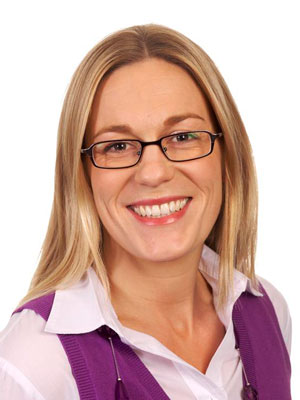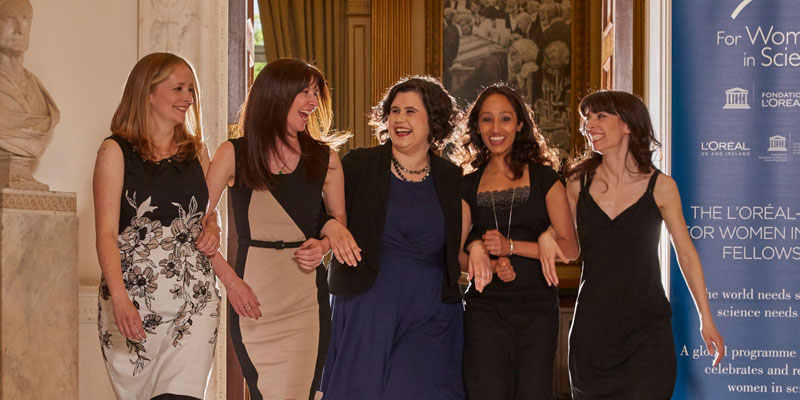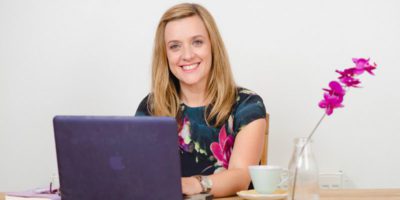Katy Gandon is Head of External Affairs at L’Oréal UK & Ireland, having joined in 2002. She studied European Business Studies in Hull, which included an Erasmus year at EDHEC in Lille and after graduating, she moved to Paris for her first job in a telecoms company. Her next job at a digital and advertising agency brought her back to London, where she worked in CRM (customer relationship management) for six years before she came to L’Oréal.

“…Girls growing up now want to hear stories from women. They want to see the women that are on the management committee, because if they don’t see them they’re not going to be able to aspire to these roles or believe that they can do it… I think as working women it’s now our responsibility to be out there and create these role models and show that everyone can achieve…”
Katy – it seems you were always destined for an international career! What got you interested in European business?
I grew up in Norwich in Norfolk in a fairly secluded area and I had this dream of being more ‘European’. I thought the whole idea of Europe and the free movement of people was a great one and I wanted to be part of it. That was a real driving force in the 80s and 90s.
On the business course that I took there was a lot of focus on Europe and what was behind it, so that was what informed me. When I was taking my A Levels I wasn’t entirely sure what I wanted to do so I didn’t want to close off any options, so I took English, French and Economics to keep my options open so I could do a broad course and find something that I felt passionate about.
Please can you talk us through your roles to date?
After graduating I’d spent a year abroad as part of my degree and that was six months in a business school and six months in a work placement in Paris. I’d had such a great six months working in Paris that when I graduated in Hull I thought I’d either move to London and look for work or move back to Paris and look for work.
So crazily, I left with £100 in my back pocket, slept on a friend’s floor and with lots of enthusiasm, managed to find a job within a few days of arriving in Paris. That was a basic marketing and coordination role for a Franco / American telecoms company, so that’s why they needed the English and the French. That was just a great first job – getting stuck in there.
I did that for about 18 months and then decided to come back to the UK. I knew by that point that marketing and communication was where I wanted to be, and I thought that a good opportunity to get experience across many industry sectors would be to go into a marketing and advertising agency because I knew that I could work with various clients in various businesses.
That was brilliant. I started off as an account exec, so again managing clients and liaising with the creative team. I enjoyed the creative side of advertising, marketing and communication, but I was never good enough to be a creative director myself, so that was lovely being agency side – it gave me a window into both worlds, so the business side, relaying what a client wants back to the creative team.
It’s challenging because you’re the go-between, and it was interesting, so the creativity box was ticked for me. There was also the business side of keeping everything on track and project management / budget management was also part of my role. I loved working agency side.
I worked my way up in that agency and in my late twenties I thought it would be nice to carry on what I was doing but to go client side. The main motivation for that was agency side was work hard / play hard – a great place to be in your twenties, but I also wanted something slightly more settled. I also found I wanted to be more strategic.
I wanted to be more involved at the beginning of the project, rather than just being called in at the end for the communications part, so I thought coming over to client side would be a great opportunity and I was fortunate enough to be offered a job here at L’Oréal. That was heading up the digital and the CRM (the customer relationship marketing) across our consumer brands.
You’ve got an interesting mix of digital and PR. What is the advantage of moving around in a large organisation like L’Oréal?
It’s fascinating. I remember agency side working on the first ever digital marketing. The World Wide Web had just started happening. (I feel like such an old dinosaur to say that now!) I remember working on my first banner and then online advertising – it was all so new.
I’d obviously developed a specialism in that while it was all happening, so that was what I could bring to L’Oréal – this interesting mix of both digital and general PR, promotion, events and all of that side of things. I suppose you’d call it brand activation now – bringing brands alive and communicating them to the public.
L’Oréal is an amazing company. Here is the UK and Ireland we look after 29 international brands, so each of these brands is part of the L’Oréal Group, but we have a real advantage in that they run like separate businesses, so you get the best of both worlds. It’s almost like you’re working on a small business and you’re completely responsible for that businesses profit and loss, and all of the strategy around that brand, and yet you’re part of this much bigger group. You’re part of a big, secure, global company.
I would say that’s a real advantage and the thing that attracted me to L’Oréal and has kept me here for so long is that it’s such an entrepreneurial place. I think this goes back to the way it’s set up. So when I worked on Garnier, we were completely responsible for running Garnier in the UK and Ireland so you have that real responsibility and you feel like you’re running your own business.
The role is entrepreneurial and there’s real flexibility around it. That’s what’s always kept me excited. From a global point of view I think there’s 78,600people working for L’Oréal and we’re in every single market. It’s been fascinating to watch because over the 12 years I’ve been here we’ve gone into new markets and I’ve never worked abroad for L’Oréal, which a lot of people do and it’s a great advantage, but you still have that experience, even if you’re country based.
Please can you tell us about your work on For Women in Science, the impact has it has had and how has it connected L’Oréal with the academic community?
For Women in Science, the international programme was created in 1998, so it’s 17 years now. That was a programme set up to celebrate women in science on an international stage. There wasn’t anything like this. There were no women-specific prizes at the time, which was why L’Oréal joined up with UNESCO to create it.
There’s other programmes that have come from it. The one I run here in the UK and Ireland is the national programme which focuses on scientists at mid-career level. There’s now 46 of these programmes going on all over the world, so it has a fantastic reach and impact.
For us, yes, we’re a fast moving consumer goods company, but our absolute heritage is in science and we would not be the company we are today if we didn’t invest heavily in science. Science and innovation is at the core of everything we do, so to have a philanthropic programme where we support science to me makes absolute sense.
It does link us into the science world on a number of different levels, not just from what we do in terms of product innovation in our own labs, it gives us access to the science world in the wider sense. For us for the academic community now being involved in this prize and giving this fellowship to researchers in an academic, scientific career, it keeps us linked to that community very, very well.
The impact of the programme, the whole of the For Women on Science programme, the international fellowships, the national fellowships, it is unbelievable. The current stat at the moment is 2250 women in over 110 countries have received fellowships of some type through this programme. The reach of the programme and impact is incredible.
One of the most important things about the programme, and why I’m passionate about, is that we’re not just a cheque writing facility. Obviously women win the fellowships and the money is fantastic for them, but what I’d say is the most important side of the programme is all the training that we give, the networking opportunities, the mentoring, the support networks.
This is something that comes up again and again in the women in science area, when people are asked the question, “Why don’t enough women go into science?” and as importantly, “Why do they drop out at mid-career level?” the feedback you get is lack of role models, not having people they can talk to in that area, not having the support and not having the recognition. These are things we can positively affect and something I feel passionate about.
I think we’ve managed to do some interesting things that are way above and beyond just giving somebody a prize or a fellowship. The other thing is when the women win the fellowships, they become part of our network. We have an alumni, we have a group of women that we’ve worked with over the years and who have received fellowships, and we continue to stay in touch with them, we continue to offer that support, so that’s incredibly important.
It’s not just a cheque, a shake of hands and then that’s it. It’s about taking it more seriously and making it long term, because that’s how we’re going to affect the problem.
Why is diversity so important and how can women in marketing and communication effect positive change for other women in other fields (like science) through the work they do?
This is interesting because we all know how diversity is critical on a general level. I heard a scientist say only last week, “You can’t just discount 50% of the population from going into science.” Science will suffer if we don’t have a diverse range of people in research who have different ideas and go about things differently. The challenges that we have in science now, as ever, but now even more so now, are really tough.
To try and advance discoveries and to try and tackle some of the big problems we’ve got in the 21st century we need people thinking differently. With diverse academic research groups it’s proven that’s where you make the breakthroughs because people tackle things in different ways, so whether that’s male / female, different ethnic backgrounds, different academic backgrounds, this mix of skills and mindsets is so important.
It’s important in the business world, it’s important on every level, particularly in science for making these breakthroughs.
Media companies we’ve worked with to deliver training women in scientific communications tell us that characteristically women are less likely to put themselves forward as media spokespeople unless they are absolutely convinced they can answer questions 150% and it’s absolutely in their area, whereas a gentleman, maybe a male scientist who gets a call from a journalist saying, “Will you comment on this?” nine times out of ten will say yes because they’re just happier to take that risk and they’re not so worried about getting it wrong.
At the beginning of the training we shown a slide of all the people who have made comment on scientific stories in the media in the last four weeks, and as you can probably imagine, 80% of them are men.
It’s interesting when you share that slide with a group of mid-career female scientists. It’s about saying, “We’re here today to give you that confidence so when that phone call comes you don’t say ‘no’.” We want to change that slide so there are more women’s faces on it, but we have to empower these women and give them the tools to do it.
It goes back to the idea of role models. The more women who are out there confidently talking about their career, whether it’s in science, or their career in marketing communications, this is about creating role models and it’s about dispelling the myths that scientists are only men.
If women are actively out there talking about their research, that then sets the precedent. It will help break down this image that women aren’t in these roles. It’s the same in financial services companies or companies in any sector. We don’t want to hear from just men all the time.
Girls growing up now want to hear stories from women. They want to see the women that are on the management committee, because if they don’t see them they’re not going to be able to aspire to these roles or believe that they can do it. In the 80s or 90s you or I growing up didn’t have that. I think as working women it’s now our responsibility to be out there and create these role models and show that everyone can achieve. It’s all out there to grab, so get out there and grab it!
You’ve had two children. How did you find returning to work afterwards each time and what were the most challenging part of this?
I’ve been very fortunate. I’ve been with L’Oréal for 12 years and when I came back after my first child I moved from being in a divisional role, working on our divisional brand, and then I came into the corporate communications team. I took advantage of asking for a four day week and the company supported me on that.
It’s really helped. It’s hard juggling four days, but I did appreciate having that extra day with them, especially when the children were younger.
We have quite a lot of support here at L’Oréal. It’s something we’ve heavily invested in over the last few years, which is fantastic. We have a support network called Parental Choice, which supports anyone working with family.
We also have an excellent flexible working scheme called Work Smart and all of our IT kit has been brilliantly upgraded so we can work remotely and we have flexible working hours and agreements in terms of people scheduling meetings. It’s been brought in and it’s been very well received. People are really doing it – they’re walking the walk, not just talking the talk.
That helps in terms of juggling childcare. It doesn’t matter what type of job you’re in these days, there’s flexibility needed. L’Oréal have been incredibility supportive and I’m very fortunate.
Going forward, all companies have to realise that if they want to retain well qualified and experienced people, they need to be competitive in terms of flexibility. Flexibility is now part of people’s needs.
What is the best bit of career advice?
I think there’s a terrible pressure when you first come out of school or university or wherever to get your ‘dream job’ straight off and you’re going to just love it from day one. Clearly that’s not the case and I think you’re setting yourself up for a very disappointing surprise if that’s what you think’s going to happen!
So I always say to people, “Look. Go out there. Try to find something that you feel passionate about. You’ve got to have passion to get up every morning and go to work, but I think if you go through your roles and you move between companies or within a company it to write down, “What do I absolutely love about this job?” and “What do I not like so much about this job?”
I think every time you have a move or a shift in your career to try and do more of what you love and a little bit less of what you don’t. As you move on in your career you’ll be doing a lot more of the things you love doing and less of the things you don’t.
My other piece of advice: You need to be flexible and open-minded and say, “Well that doesn’t immediately seem like it’s where I want to go, but what are the longer term possibilities for me taking this role. And again, stay open minded and try things that you might not think immediately might be spot on for you because you may surprise yourself in that things lead on to other things.
Keep open-minded because flexibility in the workplace is so important from an employee and an employer point of view.
What is next for you in your role at L’Oréal?
The whole reason why I love this job so much is because L’Oréal is a meritocracy and an entrepreneurial place. You’ll say, “There’s an opportunity here” and they’ll say, “Why don’t you go for it?” It’s not a rigid company. That suits somebody like me very well.
This role is great. Our aim is to support the cause of women in science and generally to persuade kids and young people to think differently about science, get into it and think of it as an opportunity and a career. I want people to think about science in the everyday sense, to recognise science more.
We have a phrase in L’Oréal which is, “Nothing is impossible.” It’s quite a good phrase, because number one, it’s true and number two it’s this feeling of seeing something, getting a gut feeling for something and going for it because you can develop it yourself!
A good example of that is a couple of weeks ago I had a phone call completely out of the blue and thought, “Well, that’s a bit bonkers!” But then I thought, “No, that’s fantastic!”
We had a phone call from somebody at the leisure group Butlins who do themed weekends and for the first time they’ve put together a science weekend for families. They asked if we’d like to be involved to provide content and workshops from our L’Oréal Young Scientist Centre that we run with the Royal Institution, which is a centre that runs workshops for kids to come and get excited about science and do different things that they don’t have the opportunity to do at school.
It’s a lovely situation to be in a role where you spot something that fits with your passion and cause, and you can run with it and go for it. Every day is a bit like that here.
http://www.womeninscience.co.uk/
https://twitter.com/4womeninscience
https://www.facebook.com/forwomeninscience





